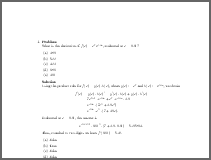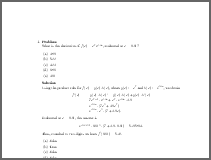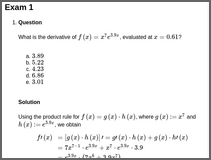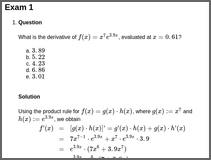deriv2: Product Rule for Derivatives (Single-Choice)
deriv2What is the derivative of \(f(x) = x^{7} e^{3.9 x}\), evaluated at \(x = 0.61\)?
Using the product rule for \(f(x) = g(x) \cdot h(x)\), where \(g(x) := x^{7}\) and \(h(x) := e^{3.9 x}\), we obtain \[ \begin{aligned} f'(x) &= [g(x) \cdot h(x)]' = g'(x) \cdot h(x) + g(x) \cdot h'(x) \\ &= 7 x^{7 - 1} \cdot e^{3.9 x} + x^{7} \cdot e^{3.9 x} \cdot 3.9 \\ &= e^{3.9 x} \cdot(7 x^6 + 3.9 x^{7}) \\ &= e^{3.9 x} \cdot x^6 \cdot (7 + 3.9 x). \end{aligned} \] Evaluated at \(x = 0.61\), the answer is \[ e^{3.9 \cdot 0.61} \cdot 0.61^6 \cdot (7 + 3.9 \cdot 0.61) = 5.215814. \] Thus, rounded to two digits we have \(f'(0.61) = 5.22\).
- False
- True
- False
- False
- False
What is the derivative of \(f(x) = x^{6} e^{2.9 x}\), evaluated at \(x = 0.7\)?
Using the product rule for \(f(x) = g(x) \cdot h(x)\), where \(g(x) := x^{6}\) and \(h(x) := e^{2.9 x}\), we obtain \[ \begin{aligned} f'(x) &= [g(x) \cdot h(x)]' = g'(x) \cdot h(x) + g(x) \cdot h'(x) \\ &= 6 x^{6 - 1} \cdot e^{2.9 x} + x^{6} \cdot e^{2.9 x} \cdot 2.9 \\ &= e^{2.9 x} \cdot(6 x^5 + 2.9 x^{6}) \\ &= e^{2.9 x} \cdot x^5 \cdot (6 + 2.9 x). \end{aligned} \] Evaluated at \(x = 0.7\), the answer is \[ e^{2.9 \cdot 0.7} \cdot 0.7^5 \cdot (6 + 2.9 \cdot 0.7) = 10.275987. \] Thus, rounded to two digits we have \(f'(0.7) = 10.28\).
- False
- False
- False
- False
- True
What is the derivative of \(f(x) = x^{4} e^{3.5 x}\), evaluated at \(x = 0.75\)?
Using the product rule for \(f(x) = g(x) \cdot h(x)\), where \(g(x) := x^{4}\) and \(h(x) := e^{3.5 x}\), we obtain \[ \begin{aligned} f'(x) &= [g(x) \cdot h(x)]' = g'(x) \cdot h(x) + g(x) \cdot h'(x) \\ &= 4 x^{4 - 1} \cdot e^{3.5 x} + x^{4} \cdot e^{3.5 x} \cdot 3.5 \\ &= e^{3.5 x} \cdot(4 x^3 + 3.5 x^{4}) \\ &= e^{3.5 x} \cdot x^3 \cdot (4 + 3.5 x). \end{aligned} \] Evaluated at \(x = 0.75\), the answer is \[ e^{3.5 \cdot 0.75} \cdot 0.75^3 \cdot (4 + 3.5 \cdot 0.75) = 38.582706. \] Thus, rounded to two digits we have \(f'(0.75) = 38.58\).
- True
- False
- False
- False
- False
num_to_schoice() by providing two common errors along with a range and minimal delta for two further random solutions.(Note that the HTML output contains mathematical equations in MathML, rendered by MathJax using ‘mathjax = TRUE’. Instead it is also possible to use ‘converter = “pandoc-mathjax”’ so that LaTeX equations are rendered by MathJax directly.)
Demo code:
library("exams")
set.seed(403)
exams2html("deriv2.Rmd", mathjax = TRUE)
set.seed(403)
exams2pdf("deriv2.Rmd")
set.seed(403)
exams2html("deriv2.Rnw", mathjax = TRUE)
set.seed(403)
exams2pdf("deriv2.Rnw")


